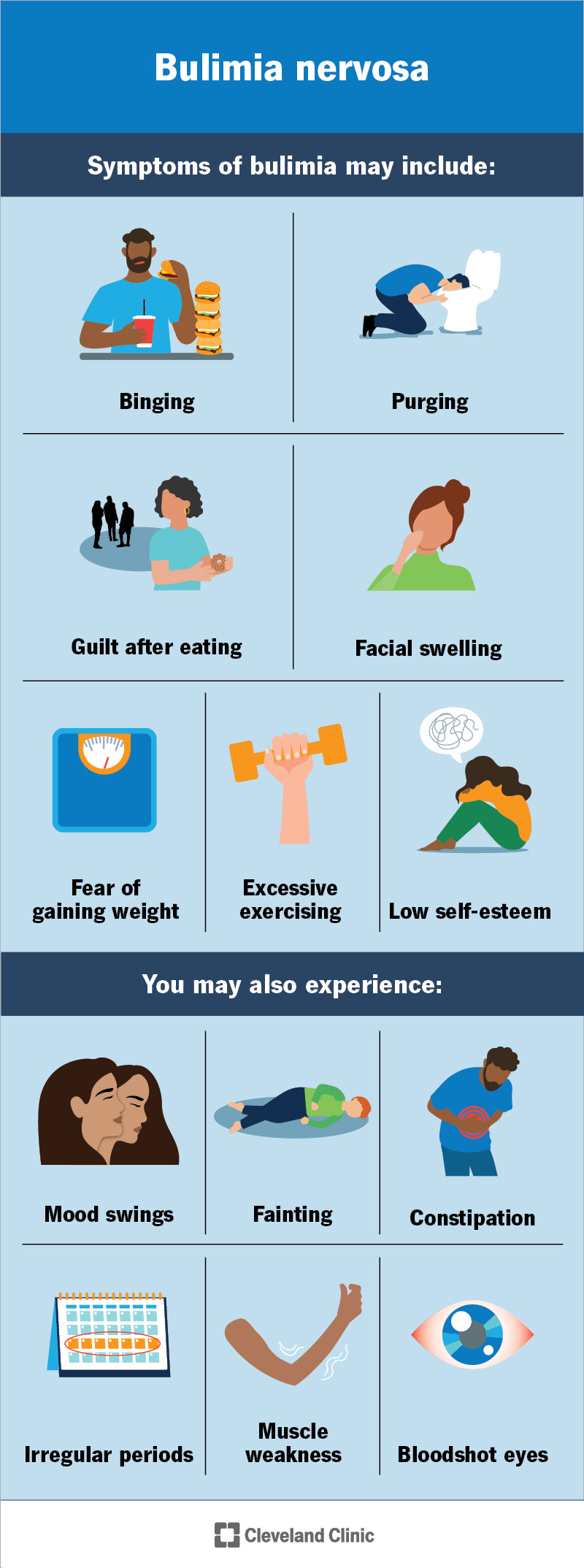Bulimia nervosa is an eating disorder that causes you to eat large amounts of food at one time (binge) and then get rid of it (purge). It can cause serious complications. But recovery is possible.
Advertisement
Cleveland Clinic is a non-profit academic medical center. Advertising on our site helps support our mission. We do not endorse non-Cleveland Clinic products or services. Policy
Bulimia nervosa, also called bulimia, is a serious type of eating disorder. It’s characterized by eating a large amount of food in a short amount of time (binging), followed by getting rid of the food (purging).
Advertisement
Cleveland Clinic is a non-profit academic medical center. Advertising on our site helps support our mission. We do not endorse non-Cleveland Clinic products or services. Policy
You may feel like you have no control over what you eat. You might eat large amounts in one sitting, sometimes in secret, leading to guilt or shame. To cope, you may try to compensate by vomiting, using laxatives or exercising excessively.
This condition also affects how you see yourself. You may judge your worth based on your appearance and feel like the only thing you can manage is how food leaves your body. This cycle is unhealthy and can lead to serious, even life-threatening, consequences. But you’re not alone. Help is available.
There are two types based on the ways you may try to clear food from your system or reduce weight gain:

Symptoms of bulimia include:
Advertisement
This condition can look different for each person. For example, you might not eat a large amount of food before purging. Sometimes, any amount of food can trigger negative feelings that may make you want to purge. The method for purging may also vary.
The exact cause of bulimia nervosa isn’t known. But researchers think it may be a combination of genetics and learned behaviors.
Popular culture and the media may put pressure on you to have a certain body type. These outside influences can affect your body image and self-esteem. Also, feeling stressed, upset or out of control may all lead to the development of this eating disorder.
Bulimia nervosa can affect anyone. You’re more at risk of the condition if you’re:
This eating disorder comes with many health risks. These are dangerous and many can be life-threatening. Complications may include:
Treating bulimia early may prevent complications and any long-term effects that the condition may cause.
To diagnose this condition, your healthcare provider will perform a physical examination. They’ll ask you about your medical history and symptoms. It’s OK to be nervous when talking with your provider. But they want to help you get better and won’t judge you. So, it’s important to be honest about your eating habits and behaviors.
Your provider will review your symptoms with the criteria in the American Psychiatric Association’s Diagnostic and Statistical Manual (DSM-5-TR). They may ask you the following questions:
There aren’t any tests to specifically diagnose this eating disorder. Your provider may order tests to see how it affects your health. These tests may include:
A healthcare provider may recommend the following treatment options:
Advertisement
There isn’t one treatment that works best for everyone. You may need to try different techniques or paths to reach your goals.
If your relationship with food causes you stress or gets in the way of your everyday life, you should talk to a healthcare provider.
Seek immediate treatment if you also have any of the following symptoms:
If you’re thinking about suicide, someone is available to help you 24/7. Call or text 988. This is the Suicide and Crisis Lifeline (U.S.). Don’t hesitate to reach out, even if you’re not in a crisis.
If you’re in immediate danger, call 911 or your local emergency services number.
Recovery is possible. It takes time to get there. Your healthcare providers will work with you to create a treatment plan that’s right for you and your symptoms. Your therapist will help you set realistic goals and work with you to achieve them.
It’s important to know that relapses are possible. A relapse is when you go back to unhealthy behaviors after a period of practicing healthy ones. It’ll be easy to see a relapse as a failure, but it’s not a judgment of who you are. Recovery is challenging and hard work. But remember, you’re never alone. Your care team can help you get back on track. They’ll make adjustments to your treatment plan as needed.
Advertisement
If untreated, you may develop serious, often life-threatening complications. It’s important to seek treatment if you haven’t already.
Everyone’s experience with this eating disorder is different. Here are some examples of what it might feel like to live with bulimia:
If these thoughts sound familiar, it’s time to reach out to a healthcare provider or mental health professional. They can help you build a better relationship with food and your self-image.
It’s common to worry about what you eat and your body size. But bulimia is much more than that. It’s an intense preoccupation that can lead to many health complications. If you think you have this condition, don’t hesitate to seek help. With the right medical care and mental health support, recovery is possible. Take the first step toward protecting your well-being by talking to a healthcare provider.
Advertisement
Your mental well-being is just as important as your physical well-being. Cleveland Clinic’s mental health experts can help you live life to the fullest.

Last reviewed on 05/16/2025.
Learn more about the Health Library and our editorial process.